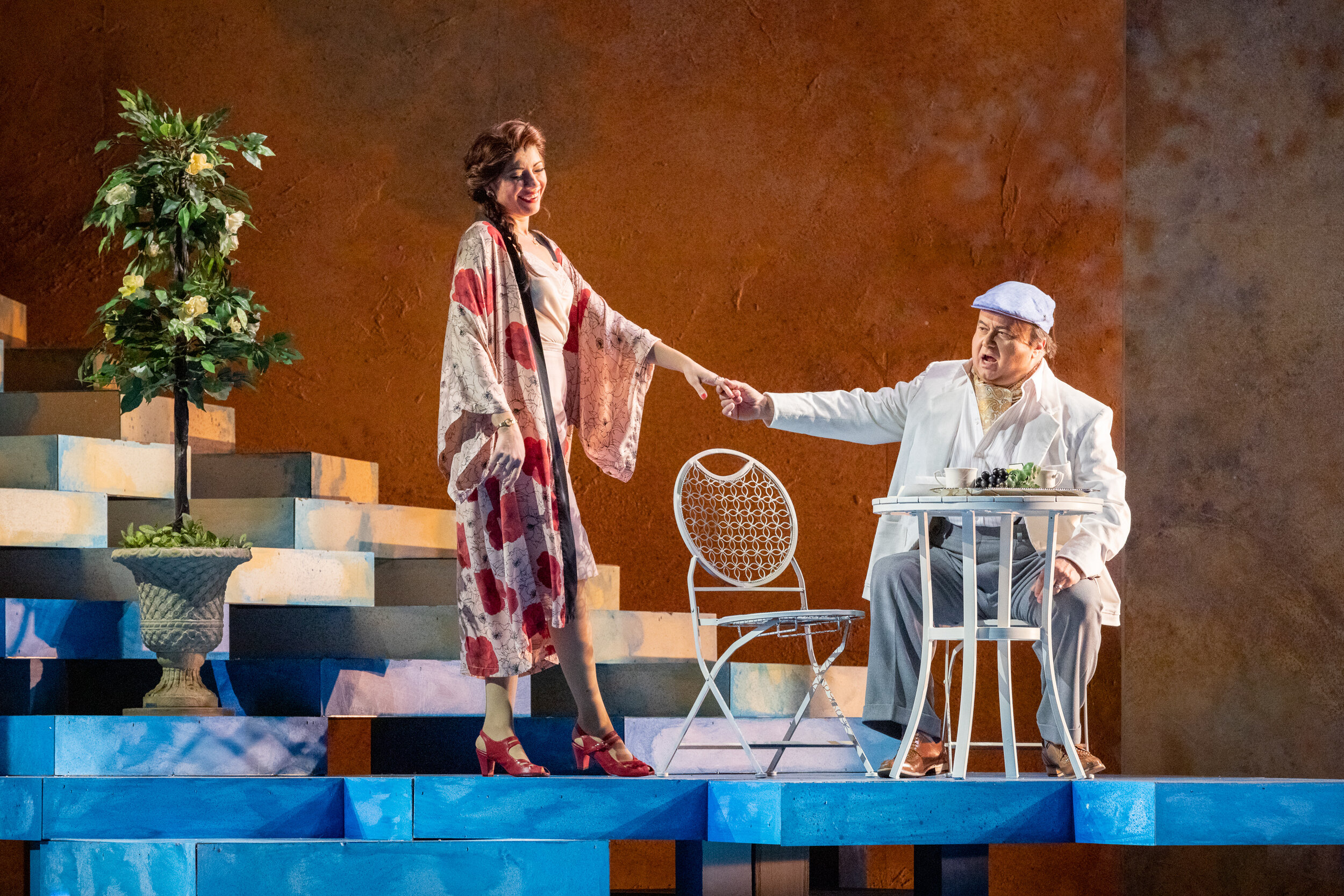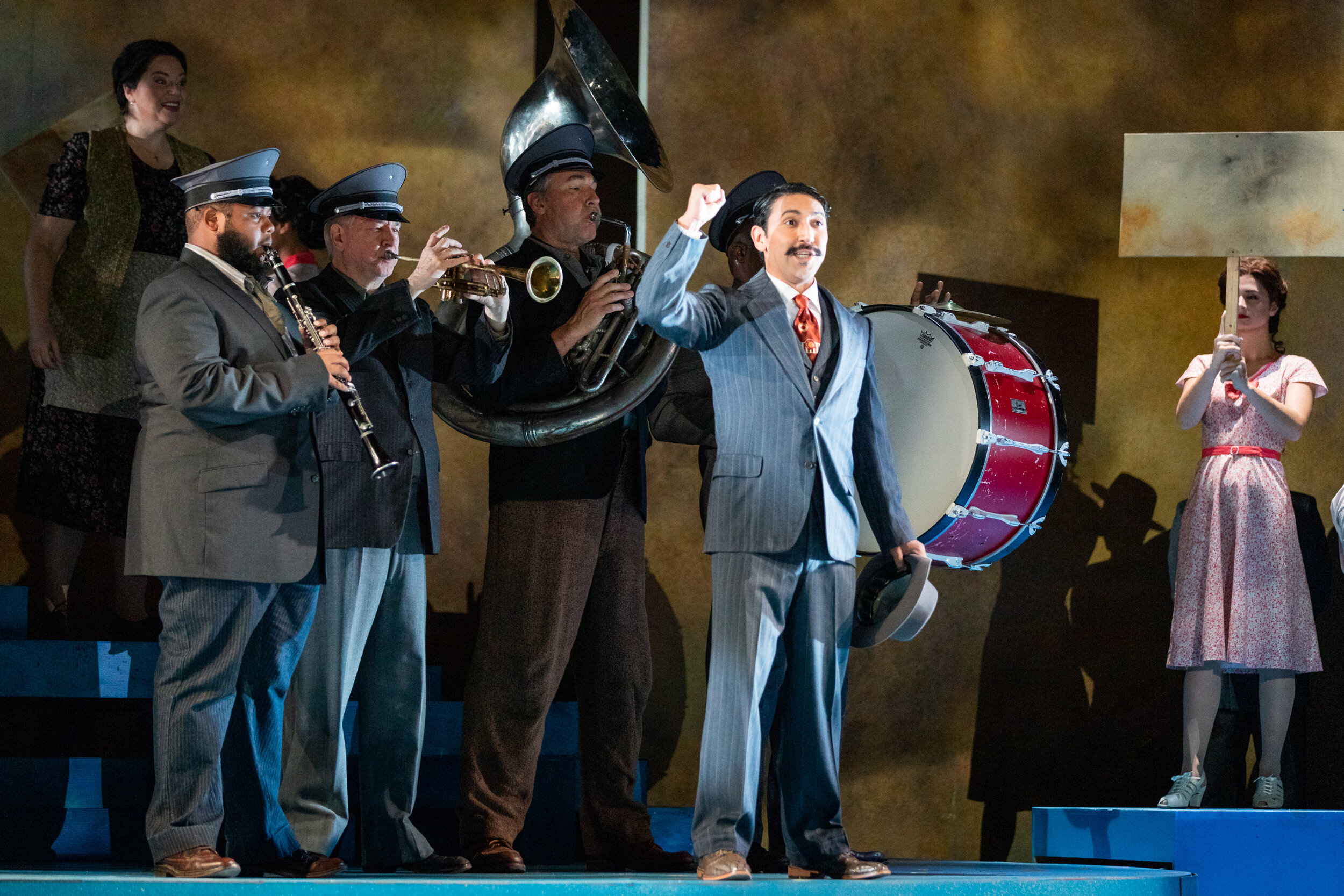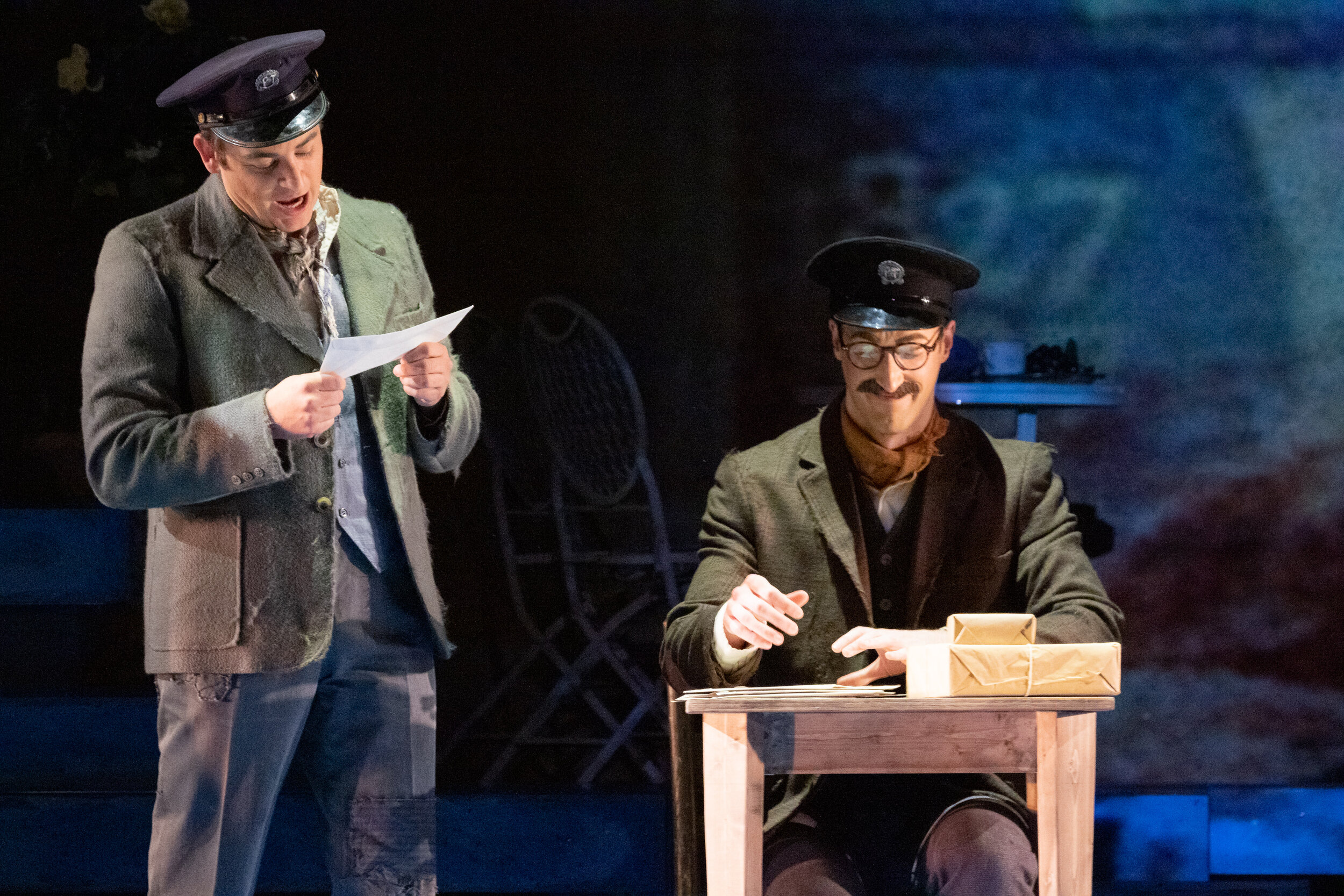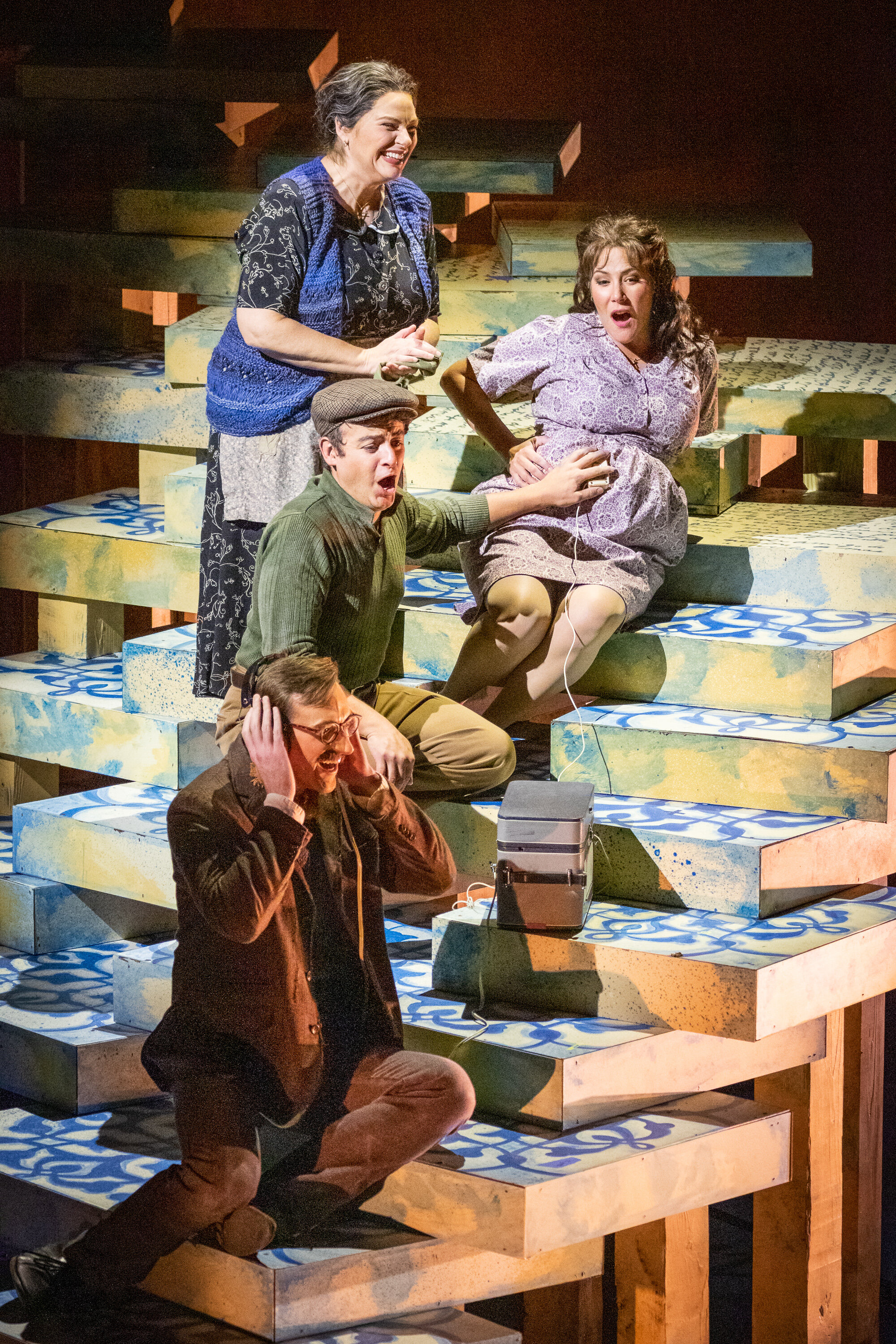If Daniel Catán had lived longer he might have become known as the Frank Capra of opera. Capra was the director of many of our most beloved, heartwarming movies, including It’s a Wonderful Life, It Happened One Night, and Mr. Smith Goes to Washington. These are not the movies that make it onto critics’ all-time best lists; these are the movies that touch our hearts, and we watch over and over. The holiday season is approaching – are you not going to watch Jimmy Stewart get saved by the angel Clarence one more time? The guiding force of love is Mr. Catán’s theme, as was Mr. Capra’s. Il Postino (The Postman, 2010) is a beautiful production based on that theme, expressed in poetry. Seeing it might even help you earn your wings, bell not included.
Postman Mario Ruoppolo making his rounds. Photo by Ben Schill Photography; courtesy of the Virginia Opera.
Composer Catan wrote four operas and was working on a fifth when he died, in addition to a substantial body of orchestral work. Florencia en el Amazonas, also a Catán opera where love triumphs, just completed a run at Pittsburg Opera. His unfinished opera Meet John Doe is based on a 1941 movie of same name, directed by none other than Frank Capra. Mr. Catán wrote the libretto for Il Postino based on the popular 1994 movie of the same name which was itself based on Antonio Skármeta’s book, Ardiente Paciencia. The opera was premiered in 2010 by the Los Angeles Opera with Plácido Domingo playing Mario. Catán is known for lush, Puccini-like scores and has written the first operas composed in Spanish to become popular in the US. Unless, you speak Spanish, I doubt whether an opera is in Spanish or Italian will make much difference to you, since the sound of the languages when sung are similar. Virginia Opera’s Glenn Winters has an excellent blog report on why opera has not flourished in Spain.
Matilde (Inna Dukach) and husband Pablo Neruda (Raúl Melo) in exile. Photo by Ben Schill Photography; courtesy of the Virginia Opera.
In Il Postino, the famous (real-life) poet Pablo Neruda has been exiled from Chile for being a member of the Chilean Communist Party, and he and his wife Matilde have taken up residence on the fictitious island of Cala di Sotto off the coast of Italy. Mario, a young man from the lower class, has been given a job as a postman with Neruda being his only customer. Mario wants to learn poetry to give him an edge in winning the love of women. He and Neruda become friends and together examine the nature of metaphor and poetry. He is also influenced by the poet’s political leanings. With the poet’s help, he wins the hand of Beatrice. But Mario’s personal growth is not over. Life moves on; he has seen what life can be on the other side of the prison bars of class divide, but he has not escaped them. Neruda returns to Chile, and local politics come crashing down. Only one poet remains on Cala di Sotto, Mario.
Neruda (Raúl Melo) explains metaphor to Mario (Daniel Montenegro). Photo by Ben Schill Photography; courtesy of the Virginia Opera.
One of the highlights of Virginia Opera’s Il Postino is the cast, beginning with tenor Daniel Montenegro who has a winning voice and portrays Mario about as effectively as this role could possibly be played. Mr. Montenegro has a long history with this opera, consulting with Catán on the role and playing Mario in a production with Plácido Domingo. The other dominant role in the opera is that of Neruda, sung by tenor Raúl Melo with a strong, clear voice; he gave us a very convincing portrayal of the poet. Soprano Danielle Talamantes sings well and plays Beatrice in an affecting performance. I did not think that soprano Inna Dukach always sang perfectly but portrayed Matilde sensuously and has a captivating voice. Mezzo-soprano Dana Beth Miller gave us an over excited Donna Rosa, Beatrice’s mother. Baritone Brett Bode as Mario’s friend Giogio and baritone Efrain Solis as the politician Di Cosimo gave fine supporting performances.
Mario (Daniel Montenegro) is engaged in a game with Beatrice Russo (Danielle Talamantes) while the three women spirits look on. Photo by Ben Schill Photography; courtesy of the Virginia Opera.
The Virginia Symphony Orchestra shone under Conductor Adam Turner’s baton in bringing Daniel Catán’s rich score to life. The music is cleverly designed to not just fit the mood of a scene but to add color to flesh out the story. In the program notes, Mr. Turner gives the example of how the nature of the music changes as it follows Mario’s growth and development. If you just attended with eyes closed, you would get your money’s worth. Catán occasionally mixes in elements of Latin American music with distinctive rhythms, especially with a tango dance scene; I wish he had done more of this. There is one aspect I feel probably limits the opera’s long run popularity. The arias are quite beautiful and, in listening to Catán scores two weeks in a row, I believe he was a gifted composer, but none of the arias have melodies that I went home humming, a little surprising considering how much I enjoyed the music. In this case, part of what captivated me and drew me in was the music contained in Neruda’s poetry. The excellent chorus also added measurably to the enjoyment of this performance.
The wedding party, l to r: Neruda (Raúl Melot), Mario’s father (Miguel Girona), Mario (Daniel Montenegro), Beatrice (Danielle Talamantes), and Donna Rosa (Dana Beth Miller). Photo by Ben Schill Photography; courtesy of the Virginia Opera.
There are two ways to look at the staging of VA Opera’s Il Postino. One is that the limitations of budget and space showed; the action in Il Postino is tightly focused in a small space while trying to convey the impression that Mario rides his bike across the island and stops in several settings. A fairer viewpoint is that Director Crystal Mannich managed to craft a charming and engaging production using resources available; kudos to her. To make a stationary bike appear to move when a movie camera cannot follow it over backroads of an island, the set itself revolves. Stairs descending and winding create an island affect and the scenes of Neruda’s house, the post office, and a bar room appear as the set revolves. Movements of characters on stage are accented by three attractive women dancers who offer various poses among the other characters. Ms. Mannich says that they represent the emotional awakening of female desire. They certainly add interest and a lyrical quality to the performance, though the connection to the story are not well made. It is unfortunate that Ms. Mannich did not have Matilde display more nudity in response to the passionate aria, “Desnuda”, sung by Neruda as a tribute to his wife. I feel this is truly a case where nudity was called for as part of the drama. The lighting and projections were well done, adding to the atmosphere of politics and poetry. Kudos to Scenic Designer Liliana Duque Piñeiro, Lighting Designer Paul Hackenmueller, and Projection Designer Tláloc López-Watermann.
left photo: Mario (Daniel Montenegro) confers with his friend Giorgo (Brett Bodet). Right photo: Politician Di Cosimo (Efrain Solis). Photo by Ben Schill Photography; courtesy of the Virginia Opera.
Artistic Director and Conductor Adam Turner says this opera initiates a series for Virginia Opera of “From Screen to Stage”, operas based on movies, partly intended to give audiences a soft introduction to modern music and opera. It is perhaps poetic that Il Postino leads off the series, especially if you like Frank Capra movies. And poetry by Pablo Neruda. Island. Sea. Friend. Roses. Spider web. Metamorphosis. By the way, my mention of angel wings above is also a metaphor.
Top to Bottom: Donna Rosa (Dana Beth Miller), Beatrice (Danielle Talamantes), Mario (Daniel Montenegro), and Giorgio (Brett Bode) celebrating recording the sound of the baby Beatrice carries. Photo by Ben Schill Photography; courtesy of the Virginia Opera.
The Fan Experience: Il Postino now moves to Richmond for its final two performances on Friday evening, November 22, and Sunday afternoon, November 24. The opera is sung in Spanish with English subtitles. As always, I strongly recommend the pre-opera talk by Dr. Glenn Winters, Virginia Opera’s Community Outreach Musical Director. I also recommend his Dr. Opera blog reports on Il Postino. The pre-opera talks begin forty-five minutes before the performances; arrive early to ensure you get a seat.








